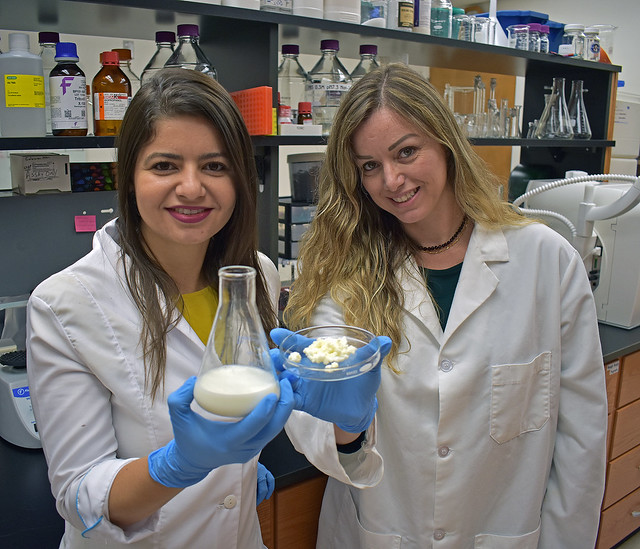Auburn veterinary researchers find that drinking fermented milk beverage may help lower blood pressure
Article body
Auburn University College of Veterinary Medicine researchers are being featured at a national meeting today for their collaborative work with Brazilian colleagues that suggests drinking the fermented milk beverage, kefir, may have a positive effect on blood pressure by promoting communication between the gut and brain.
Mirian Silva-Cutini, a doctoral exchange student, and the first author of this work, is presenting the team’s findings at the American Physiological Society annual meeting at “Experimental Biology 2018” in San Diego. Silva-Cutini conducted her research at Auburn’s College of Veterinary Medicine under the direction of Dr. Vinicia Biancardi, an assistant professor in the Department of Anatomy, Physiology and Pharmacology.
Kefir is a fermented probiotic milk beverage known to help maintain the balance of beneficial bacteria in the digestive system. Previous research has shown that an imbalance in the gut’s colony of bacteria (microbiota) may cause high blood pressure in some people. Similarly, probiotics—live bacteria supplements that are beneficial to the digestive system—have been found to lower blood pressure, but the mechanisms by which this occurs are unclear.
The Auburn research team, in collaboration with the University of Vila Velha in Brazil, studied three groups of rats to determine how kefir reduces high blood pressure (hypertension):
-
One group had hypertension and was treated with kefir (“treated”);
-
One group had hypertension and was not treated (“untreated”);
-
One group had normal blood pressure and was not treated (“control”).
After nine weeks of kefir supplementation, the treated rats had lower levels of endotoxins (toxic substances associated with disruption in the cells), lower blood pressure and improved intestinal permeability when compared with the untreated group. Healthy intestines allow some substances to pass through, but generally act as a barrier to keep out harmful bacteria and other potentially dangerous substances. In addition, kefir supplementation restored the natural balance of four different bacteria in the gut and of an enzyme in the brain essential for normal nervous system function, suggesting that the nervous and digestive systems work together to reduce hypertension.
“Our data suggests that kefir antihypertensive-associated mechanisms involve gut microbiota-brain axis communication during hypertension,” the researchers wrote.
The study is an example of Auburn faculty and students working toward life-changing solutions to meet pressing global health issues.
Related Media
Media interested in this story can contact Communications Director Preston Sparks at (334) 844-9999 or preston.sparks@auburn.edu.
The College of Veterinary Medicine is the South's original and nation's seventh oldest veterinary medical program, celebrating 126 years. We prepare individuals for careers of excellence in veterinary medicine, including private and public practice, industrial medicine, academics, and research. The college provides programs of instruction, research, outreach, and service that are in the best interests of the citizens of the state of Alabama, the region, the nation, and the world.





